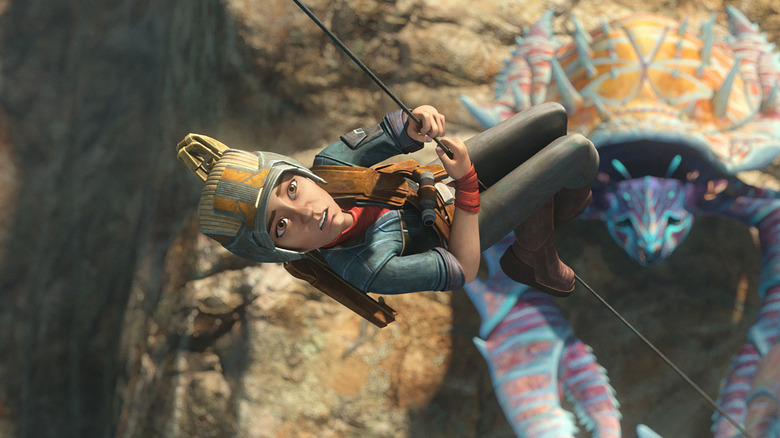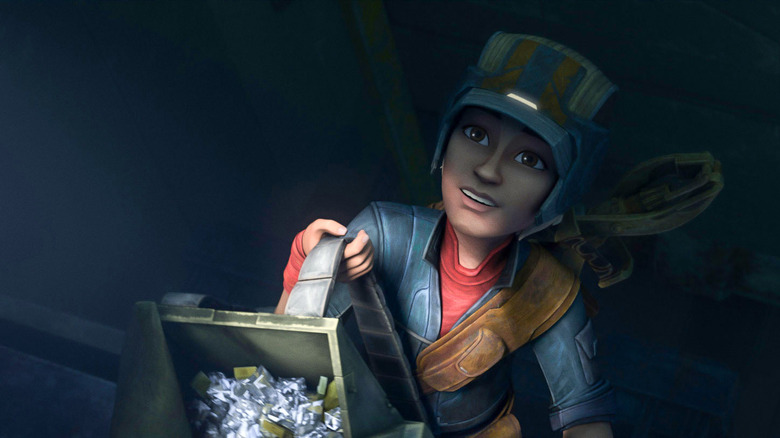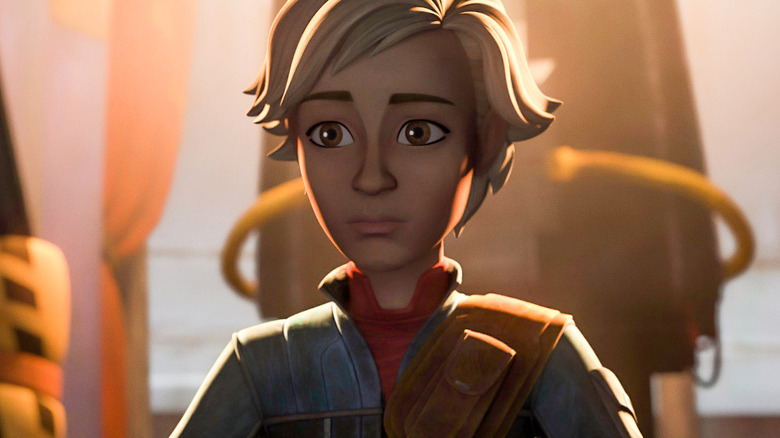Why Star Wars: The Bad Batch's Season 2 Time Jump Was Especially Important For Omega
"The Bad Batch" has been an interesting addition to the larger "Star Wars" franchise. The first season offered exciting clone action and a darker tone compared to "The Clone Wars," showing us the rise of the Empire from the point of view of the soldiers bred to fight it.
And yet, despite some poignant moments, one of the main issues of that first season is that "The Bad Batch" felt mostly like just a kid-friendlier version of "The Mandalorian." You had four touch warriors serving as father figures to a child, they go on side quests with said child and protect them since they are too young and unfamiliar with combat. Most of the season, then, is spent seeing these warriors fighting off countless perils while the child looks in wonderment.
That changes this season. "The Bad Batch" returns with a time skip, and in its premiere episode, we see Omega as a fully fledged member of the Batch, adept with the energy bow she found last season. Unlike Grogu, who is still just a baby who can't even say a word, Omega doesn't have to wait for her brothers to come and save her, but is perfectly capable of saving herself. Out of all the changes the characters are going through this season, Omega is arguably going through the biggest.
A brand new Omega
Michelle Ang, who voices Omega, thinks the time skip going into season 2 deeply changed Omega, and she will continue to change throughout the season. As she told Comicbook.com, "Omega's shed off some of her childlike wonder":
"We're moving a little bit into adolescence. We're moving into a space where Omega wants to have her views heard, wants to have a voice, and I think what's interesting is she's very much secure in her place in the Bad Batch."
Indeed, throughout the season, Omega expresses her opinions more. She does so not in a way where she's just objecting to what the others are doing, but rather demanding her opinion be taken seriously. More often than not, it is. "In Season 2, right from the jump, you get the impression, you see that Omega is very comfortable and the Batch absolutely value her and she has her own merits and her own skills that she adds to the squad," says Ang.
As Ang told us during an interview prior to the season premiere, Omega has a naive worldview because, despite being technically older than her brothers in the batch, she has seen less of the world and knows less of its problems and cruelty. We see this in how quick she is to trust and to forgive, and in how quickly she jumps a the change to help or defend others. Omega lacks war experience, as she only left Kamino when she joined the Bad Batch
"[She's] learning that there's so many different powers at play in the universe and that her and her brothers being free and independent, they can make a choice about how they exist in the universe," Ang told us. "And that's sort of her journey along with the Batch to go through."
It's the season for change
Of course, Omega is not the only character who changed going into "The Bad Batch" season 2. As we see in the first three episodes, both Echo and Crosshair have been deeply affected by the events of the first season and the rise of the Empire. Crosshair is realizing just how alone he is in his convictions, fully devoting himself to following Imperial orders without question — no matter the price.
As for Echo, this season presents an inner struggle, and a clash with the rest of the Bad Batch. You see, having lived and fought with the "regular" clones for most of the war, Echo is determined to do more to help out clones who are being oppressed by the Empire, and to fight back.
"The Clone Wars" did many things right, but arguably none were as significant as making us care about the faceless army of clones that gave the underrated "Attack of the Clones" its title. "The Bad Batch" is doubling down on this idea by showing us some of the names that were forgotten in the time between the end of the war and the Galactic Civil War of the original films, how the rise of the Empire affected the army that gave it power.


